Editor's Note
The first post in this series is at this link.
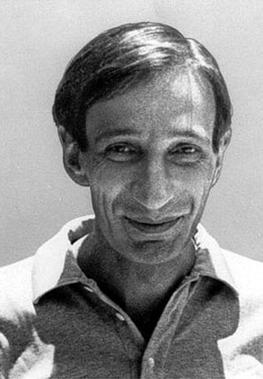
Ivan Illich, undated, courtesy of Wikipedia.
Given my ignorance and the importance of personal, social, institutional context, today I want to think about Illich’s life and influences. If my goal is to fully understand Medical Nemesis, I need to know how he arrived at that work and his other books. And there are simmering questions: Why did he come to be such a fierce critic of modern life, of modernization and modernity? How was he educated? How did a foreign-born, former Catholic priest become a celebrity cosmopolitan thinker important to American critics of medicine and society?
Before continuing, I want to acknowledge that I have not read the one work that is closest to a biography of Illich: Todd Hartch’s The Prophet of Cuernavaca: Ivan Illich and the Crisis of the West (Oxford University Press, 2015). I just learned of Hartch’s book and, while I intend to read it, what follows has been pieced together from various obituaries and retrospectives. I stand by the facts below, but Hartch likely offers some perspective, hopefully grounded in primary sources, that will have to wait for another day.
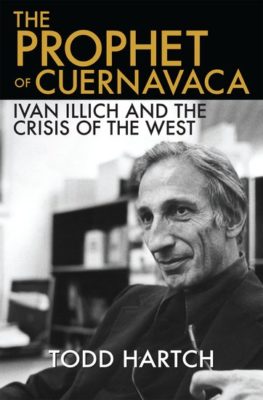 The Basics
The Basics
Illich was born on September 4, 1926, in Vienna, Austria. His mother was a Sephardic Jew (i.e., from Spain and/or Portugal). Illich’s father was a Catholic, Croatian civil engineer, descended from Dalmatian royalty. Ivan had two sibling brothers, Micha and Sascha Illich, who lived in New York City and Nantucket (MA), respectively, as of 2002.[1]
Ivan Illich’s formal education began in Vienna. In the cosmopolitan environment of “Red Vienna” he had learned several languages. His family was expelled from Austria in 1941 due to his mother’s Jewish heritage. His family’s landing place is unclear, but Ivan ended up attending the University of Florence. There he found a vocation and attended Rome’s Pontifical Gregorian University. After the war he returned to Austria’s University of Salzburg to earn a doctorate, focusing his studies on famous British historian Arnold Toynbee.[2]
It is worth pausing to consider a number of crucial questions about his formation this early period of his life: How did he work out the mixed religious background of his parents in favor of Catholicism? How did his parents, and Illich himself, handle the cultural, social, and political influence of “Red Vienna”? Why did Illich join the priesthood? When did his interest in history begin, and why? How did his facility with languages help or affect his education trajectory? Why the move from Vienna to Florence in terms of education? How did he manage Mussolini’s fascism in Italy?
Around the age of 25-26, Illich’s story continues in New York City. We may assume that his language proficiency included Spanish, because in 1952 he was assigned to work with a Puerto Rican community in Washington Heights borough in the north/northwest corner of Manhattan. One of his activities there included creating an employment agency. One indication of his stature or fame there came from a fellow priest, who in the early 1970s said he was something of a “Babe Ruth” with his flock. From Washington Heights he was assigned, in 1956, to help lead, as vice rector, the Pontifical Catholic University in Puerto Rico. In Illich’s 2002 NYT obituary, Douglas Martin described Illich as full of energy and known for his intellect, while also becoming a critic of the Church as an institution, focusing on “its smugness, its bureaucracy and its chauvinism” (quote from Martin). Illich’s undoing in Puerto Rico came courtesy of reproductive politics. He was forced out of Pontifical Catholic University by local bishops after he supported a gubernatorial candidate advocating for public-sponsored birth control.[3]
From this period, in relation to his work with Puerto Ricans at home and in the United States, it seems safe to conclude that Illich developed a ground-level identification with the oppressed—with the victims of imperialism and racism—as well as a bottom-up critique of the failures of large-scale institutions.
After a brief return stint back in New York City, Illich was assigned to the place that would eventually become his intellectual, spiritual, and physical home: Cuernavaca, Mexico. Cuernavaca is the capital of, and largest city in, the Mexican state of Morelos. It is located about 40 miles south of Mexico City and, with a mild climate at 5000 feet elevation, has been long-favored as a retreat for Mexico City’s elite. Putting to use his progressive cosmopolitan sensibilities, and his newfound Church title of ‘monsignor’, Illich founded the “Centro Intercultural de Documentación” (CIDOC, or Intercultural Center for Documentation) in 1961. From the CIDOC, Illich trained priests and laypeople (students, missionaries, and otherwise) who sought to become volunteers in Latin America. The Center offered courses on language and culture.[4]
At the Center, and as the intellectual mood of the 1960s progressed, Illich’s criticisms of the Church become more intense, vocal, and wide-ranging. In addition to his contrary position on birth control, Illich opposed the assigning of more priests to Latin America and advocated for more lay control of Catholic Church functions. Martin called Illich “populist.” He also reported that the Vatican proclaimed Illich “politically immoral,” which led to his departure (voluntary or forced?) from the priesthood in 1969.[5]
Illich’s Books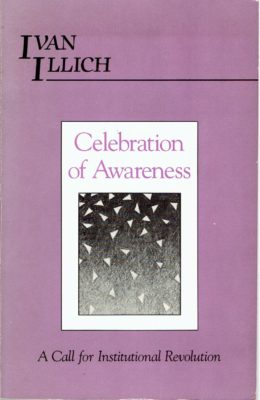
From the late 1960s and onward, Illich began putting his activism and ideas down in writing. And he did so rapidly, especially in the form of books.
First came Celebration of Awareness: A Call for Institutional Revolution in 1969. Two years later, in 1971, he produced Deschooling Societyreviewed in the NYT by Anatole Broyard, who notes Illich’s concern for the victims of poverty). Next was Tools for Conviviality (1973). Energy and Equity appeared in 1974. Medical Nemesis: The Expropriation of Healthwas first published in 1974, but finalized a few years later (sometimes titled Limits to medicine: Medical Nemesis: The Expropriation of Health).[6]
Two works rounded out the 1970s, both produced in 1978: The Right to Useful Unemployment and Toward a History of Needs.
In the 1980s, Illich published four books: Shadow Work (1981), Gender (1982), H2O and the Waters of Forgetfulness (1985), and ABC: The Alphabetization of the Popular Mind (1988, coauthored with Barry Sanders–academic and Pulitzer Prize nominee, not the all-world, Hall of FAm NFL running back of the Detroit Lions).
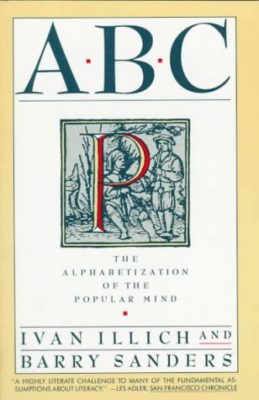 Rourke summarized Illich’s output through the mid-1980s: “…his books met with mixed reviews by critics, who praised his keen intelligence but complained that his research was selective and one-sided and that he rarely offered alternatives to the social situations he decried.”[7]
Rourke summarized Illich’s output through the mid-1980s: “…his books met with mixed reviews by critics, who praised his keen intelligence but complained that his research was selective and one-sided and that he rarely offered alternatives to the social situations he decried.”[7]
The 1990s saw the last of Illich’s single-authored, non-collaborative books (followed by a few collaborative/edited publications with/by David Cayley): In the Mirror of the Past: Lectures and Addresses, 1978-1990 (1992), In the Vineyard of the Text: A Commentary to Hugh’s Didascalicon (1993),Blasphemy: A Radical Critique of Our Technological Culture (1995).
Ivan Illich died on December 2, 2002, in Bremen, Germany, at the age of 76.
Legacy and Influence
When he died, Martin’s NYT obituary noted that Illich was “perhaps best known for his 1971 book, De-Schooling Society.” The Times noted that the book “protested mandatory public education” and that Illich could be grouped with Paul Goodman in terms of “ambivalence” educational institutions. Martin pithily summarized Illich’s life as follows:
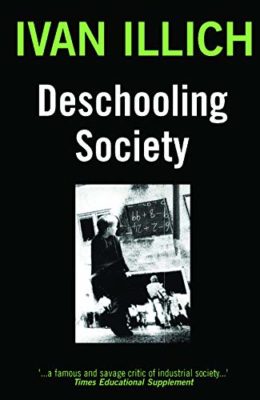
Mr. Illich was a priest who thought there were too many priests, a lifelong educator who argued for the end of schools and an intellectual sniper from a perch with a wide view. He argued that hospitals cause more sickness than health, that people would save time if transportation were limited to bicycles and that historians who rely on previously published material perpetuate falsehoods.[8]
Likewise, Britannica summed up Illich this way:
Austrian philosopher and Roman Catholic priest known for his radical polemics arguing that the benefits of many modern technologies and social arrangements were illusory and that, still further, such developments undermined humans’ self-sufficiency, freedom, and dignity. Mass education and the modern medical establishment were two of his main targets, and he accused both of institutionalizing and manipulating basic aspects of life.[9]
The sociologist and Boston University emeritus professor Peter Berger, in First Things, noted Illich’s contradictions and disappointments to various groups:
It is easy to see why Illich’s ideas resonated well in the cultural climate of the time. But he disappointed, one by one, most of the groups who first believed him to be one of them. Catholics were irritated when he criticized missionaries in Latin America as cultural imperialists. The counterculture discovered that he found repugnant many if not most of their proclivities, from drugs to promiscuous sex. He upset the left when, after a visit to Cuba, he described the Castro regime as an odious tyranny. And feminists were deeply offended when he argued, some years after “Shadow-Work,” that women had been better off in traditional societies in which they devoted themselves to the life of the family. Illich was a genie who could not be kept in any bottle. Like Goethe’s Mephistopheles, he was a ‘spirit who ever negates.'[10]
Conflict is a recurring theme in Illich’s life. Finally, in a summary that appeals to my historical sensibilities, Mary Rourke wrote:
Illich’s numerous books and articles earned him a reputation as a crank and a visionary whose first allegiance was to the past. He saw modern technology as oppressive, claiming, for example, that cars enslaved society and that bicycles were a faster way to travel.[11]
I hope this exploration has provided an adequate taste of Illich’s life, works, and legacy. In the next installment for this series I intend to dive deeply into Medical Nemesis. (The book is on order, but hasn’t arrived as of writing.) – TL
————————————————-
Notes
[1] Peter L. Berger, “Remembering Ivan Illich,” First Things, March 2003, accessed 5/16/2020; Aaron Cooley, “Ivan Illich: Austrian Philosopher and Priest,” Encyclopedia Britannica (Chicago: Encyclopædia Britannica, 2019); Douglas Martin, Ivan Illich NYT Obituary (No Headline), The New York Times (December 4, 2002), A29, accessed 5/2/2020; Mary Rourke, “Ivan Illich, 76; Ex-Priest Condemned Modernity,” Los Angeles Times (December 7, 2002), accessed 5/16/2002. Berger was a sometime colleague and associate of Illich’s, and he recounts some first-hand interactions beginning in 1969.
[2] Ibid.
[3] Ibid.
[4] Ibid.
[5] Ibid.
[6] Cooley; Berger; Anatole Broyard, “Books of The Times,” The New York Times (June 4, 1971), 33.
[7] Rourke.
[8] Martin.
[9] Cooley.
[10] Berger.
[11] Rourke.

5 Thoughts on this Post
S-USIH Comment Policy
We ask that those who participate in the discussions generated in the Comments section do so with the same decorum as they would in any other academic setting or context. Since the USIH bloggers write under our real names, we would prefer that our commenters also identify themselves by their real name. As our primary goal is to stimulate and engage in fruitful and productive discussion, ad hominem attacks (personal or professional), unnecessary insults, and/or mean-spiritedness have no place in the USIH Blog’s Comments section. Therefore, we reserve the right to remove any comments that contain any of the above and/or are not intended to further the discussion of the topic of the post. We welcome suggestions for corrections to any of our posts. As the official blog of the Society of US Intellectual History, we hope to foster a diverse community of scholars and readers who engage with one another in discussions of US intellectual history, broadly understood.
Hello Professor Lacy,
My name is Sajay Samuel. I co-edit a newly established book series titled: Ivan Illich, 21st Century Perspectives published through Penn State University Press. An intellectual biography of Illich by David Cayley, is due for publication next year (mid 2021). In my opinion, the best single overview of Illich now available is Ivan Illich in Conversation, Ed. David Cayley, Anansi Press 1992.
https://www.amazon.com/Ivan-Illich-Conversation-David-Cayley/dp/088784524X
I understand your interest in exploring the ‘anti-vaccination movement, medicine gone wrong, medical expertise, Ivan Illich, and anti-intellectualism (broadly considered)…’
Recently (Feb 2019) Richard Smith ( once was editor of the British Medical Journal) published a review of a book on medicine by Seamus O’Mahoney.
https://blogs.bmj.com/bmj/2019/02/13/richard-smith-most-devastating-critique-medicine-since-medical-nemesis-ivan-illich/
Smith also refers to Illich. His review suggests the virtue of a nuanced perspective –for instance, grasping the contrast between vigorous criticism and anti-intellectualism (however construed) — when approaching the writings of Illich on medicine.
best regards
Sajay
Sajay Samuel
Clinical Professor of Accounting
Penn State University
Sajay: Thanks for this comment. I’m pleased to hear about the Cayley book. I’d love to read, or review it, when it’s out. Otherwise I’m guessing you’re right about the *Illich in Conversation* book. It seemed to have the most potential while I was digging into the the bibliography. Meanwhile I will read the Smith review of the O’Mahoney book. – TL
Professor Lacy,
It is great to see someone digging into this. Since you are specifically looking at Illich what led to Medical Nemesis, I suggest you also look at “The Powerless Church and other selected writings” edited by Valentina Borremans and Sajay Samuel. There are 2 essays, “Rehearsal for Death” and “The End of Human Life” that provide some thought on life and death. Then also read “Hospitality and Pain” (this can be found online fairly easily – https://chamberscreek.net/library/Illich/hospitality.pdf). I believe Illich’s thinking on avoidance and death inform his critique of the medical system. Hospitality and pain was written after Medical Nemesis, but when read with the other essays may help you unpack how a Catholic priest became an important critic on the medical system.
Good luck!
Joey Mokos
Thanks to Tim Lacy for directing attention to Ivan Illich’s work. Just a bit of historical context. If Illich presided over the later days of the Free School Movement in the late 1960s and early 1970s, Paul Goodman, whom Tim also mentions, might be seen as the founder of the radical educational movement of the 1960s. Once works like Goodman’s Growing Up Absurd and The Community of Scholars began to percolate down, things began to loosen up and radical reforms gained in momentum. This replaced the tattered reputations of John Dewey and the Progressive education movement which had been thoroughly domesticated by the educational establishment after World War II, Goodman and other reformers such as Jonathan Kozol, John Holt, Herbert Kohl, and George Dennison, to name a few, suddenly were publishing books every month or so it seemed. Universities across the country saw the emergence of “free universities” loosely attached to the established departments and divisions. Goodman was particularly interested in this aspect of the radical reforms in education. The “teach-in movement” around the country saw education and politics working together to challenge the war in Vietnam.
Goodman, was a communitarian anarchist and his emphasis fell upon decentralization of power, thus going against the “top down” approach of liberalism and socialism/marxism. There were differences in emphasis–Goodman was more concerned with a rethinking of higher education, while most of the other reformers tended to focus on early childhood education. Stuart Brand’s Whole Earth Catalogue was a fascinating tool kit of ideas, texts, projects that served as a kind of Sears, Roebuck catalogue for the free schools and the counter-culture. Erik Erikson and Robert Coles were figures who brought psychoanalysis to bear on the problematic of identity formation which was so prevalent at the time.
There is so much here that sheds light on the intellectual history of teaching and learning in America, that a paragraph or two can only be a way of namedropping and hoping people follow up. Overall, then, my purpose in commenting on Tim’s important work on Ivan Illich and his(Tim’s) own engagement with the idea of anti-intellectualism is to point to the rich intellectual seedbed that Illich’s work already found in place.
Thanks to Richard King for the above comment. I hadn’t thought about some of these names/writers, for instance John Holt, in a long time. Another critique from this period, in addition to those mentioned, is Charles Silberman, Crisis in the Classroom (1970). Jonathan Kozol’s 1967 book Death at an Early Age was a blistering indictment of (as the subtitle put it) the “destruction of the hearts and minds of Negro children in the Boston public schools.” Decades later Kozol was still writing about educational inequality, an indication that while some things might have changed, others had not. If I did read or dip into Illich’s Deschooling Society, I don’t remember it well enough to comment on it, except to say that I suspect or guess that it advanced a more radical position w/r/t to organized education in general than some of the others mentioned.